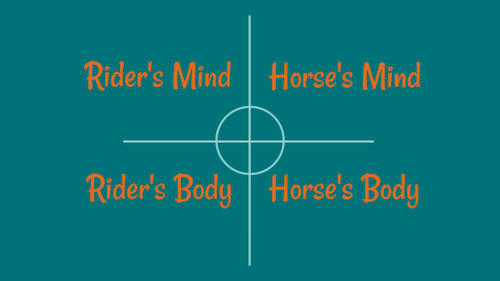Have you ever felt stuck when evaluating a problem with your horse? I found myself drawing this chart over and over again in my journals and explaining it to friends. It is my simple evaluation tool that I use to analyzing problems or answer questions about horses and riders.
The problem.
When someone poses a problem they are having with their horse my mind automatically runs through this. For example, I was recently asked a question about a horse that gets nervous when trail ridden on hills. The person asking the question was clearly angling towards the idea that the horse was mentally nervous.
While this is a good observation my mind jumped to the question, “What other things could be at work here?
What would make a horse nervous about hills? What makes them different than flat trails?
The 4 square model.
Let me show you what runs through my mind quickly which is the 4 Square model in use.
Horse’s Mind– The rider described the horse’s mind as nervous.
Horse’s Body– Tired or sore could make the horse uncomfortable.
Rider’s Body– Out of balance rider could make hills more difficult for the horse.
Rider’s Mind– Rider didn’t indicate any fear or stress related to the question.
Narrowing the problem.
This was a written question so I did not get to observe the horse and rider. I find that even with that limitation riders are often quite accurate in their descriptions. They tend to struggle more with how to understand what they are observing. Both of my first thoughts revolve around the body of both the horse and the rider.
I have often found that people have difficulty telling when their horses are getting tired. They can identify exhaustion but often don’t accurately read the general decline that happens when a horse gets tired. In the past, I struggled with this myself. Even now I work to stay aware of how much quality energy my horse has when I ride. Horses are similar to us in many ways and one is in the fact that their form when exercising will become less correct when they are tired.
Less correct form often equals physical discomfort. Physical discomfort in the same situation over and over will increase the likelihood of anxiety around the situation. Something as simple as being tired or out of shape could be causing the nervousness.
A simple test in this situation would be to dismount and lead the horse up and down the hills for a while.
WHAT?! DISMOUNT AND WALK?! I know, I have had that same thought before. You are in good company.
Yep. And if that is a problem then it might just point to the other thing I mentioned. Out of shape riders are more likely to be out of balance. This can cause more work for the horse.
Give it a try.
The 4 Square model is my quick little evaluation tool that I use every day when I ride and when I answer questions. Give it a try next time you get stuck.
9 Comments
Leave a Comment

FREE PDF DOWNLOAD
WHY IS MY HORSE...?
100% Private - 0% Spam
No one taught you the skills you need to work through these things.
Riders often encounter self-doubt, fear, anxiety, frustration, and other challenging emotions at the barn. The emotions coursing through your body can add clarity, or can make your cues indistinguishable for your horse.
Learning these skills and begin communicating clearly with your horse.
Click here to learn more.

Excellent advice!
So true as my husband’s horse got old he began running away while being caught. He also began tripping more often at the end of the rides. We finally realized his knees where hurting him. My young, lighter daughter now rides him and we give him some anti-inflammatory for harder rides, and he is back to his happy self. I often wonder how much we miss.
Truth!
Being out balance out of shape causes
Less than perfect conditions
Makes the rider unsure and the horse
Yes i agree that lot of horse riders find difficulty telling when their horses are getting tired. which lead them to put the horse to do more effort which which will exaust the horse and might cause some serious dammages.
Excellent advice!
Excellent advice. I have an older horse, live on the Alabama Gulf Coast and one of the places we trail ride has deep sand. When the riding season starts back up in late fall I am always careful about breaking my mare in when riding in that sand because I know how hard it is for me at the beach. Thanks for the word up.
You’re very welcome and your plan sounds great. Surfaces like sand make the muscles tire and increase the chances of damaging ligaments and tendons if riders aren’t as aware as you. When fatigue happens something often gives. Do you get to ride on the beach too? I’ve only done it a couple times but it was really fun!
Dear Stacy, love this latest tip. I recently experienced a back issue and couldn’t understand why my horse would drift to the right. Turns out once I got some physiotherapy on my back I could hold my leg in place.
As a result I was finally able to lope a carousel obstacle in competition , something that has alluded me for 3 years. It took me a long time for the lights to go on that I just couldn’t keep my leg firmly in place!
Karen, that exactly what I’m talking about! As a pro rider, it is easier to find my own imbalances because if ALL the horses have the same issue…then the issue is probably me. When people have one or two personal horses the imbalance on both horses can feel normal to that rider and go undetected for a long time.
I’m glad you figured that out!